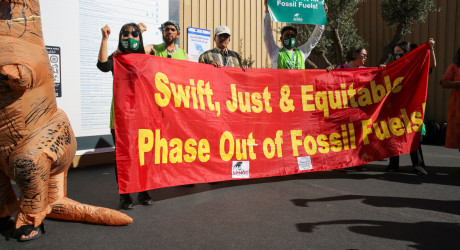PUBLIC FINANCE
Governments are still spending billions subsidizing oil, gas and coal. We need to #StopFundingFossils and start investing in the future.
OVERVIEW OF WORK
Since the Paris Agreement, G20 governments have continued to finance more than USD 77 billion dollars annually in fossil fuels through multilateral development banks (MDBs), bilateral development finance institutions (DFIs), and export credit agencies (ECAs). This is three times the support they provide to clean energy. Beyond providing this direct monetary backing, these institutions reduce perceived risk and provide a government stamp of approval on fossil fuel projects that often serves to crowd in private finance. While recently the level of fossil fuel support has started to drop, institutional policies to exclude fossil fuel finance are needed to ensure this progress continues.
While a number of public finance institutions committed to ending coal finance in the early 2010s, it wasn’t until 2017, following years of campaign pressure by Oil Change and others, that the World Bank made a meaningful commitment to stop financing for upstream oil and gas. Following an intense campaign effort, in 2019 the European Investment Bank committed to ending nearly all oil, gas and coal finance. Recently, the UK announced it would end overseas oil and gas finance, and the EU and US, among others, have signalled that they intend to follow suit. Building off these successes, OCI is now working to secure further commitments from governments and public finance institutions on ending public finance for fossil fuels.
LATEST PROGRAM POSTS
Never before has there been such a detailed, peer-reviewed mapping of fossil fuel subsidies in the Netherlands. The report identifies 31 fossil fuel subsidies that, combined, provide €37.5 billion per year in fossil fuel subsidies between 2020 and 2022.
Today, 27 environmental and civil society organizations from Papua New Guinea, the Asia Pacific region and the United States submitted a letter to the U.S. Export-Import Bank (EXIM) urging it to oppose support for the Category A Papua liquefied natural gas project.
Rather than match the international policy, today’s announcement leaves the door open indefinitely to domestic public finance for oil and gas, only committing to “announce by fall 2024 the implementation plan” to phase out these flows.
Italy’s export credit agency SACE has approved a $500 million guarantee in loans for the Talara oil refinery in Peru, once again breaking their commitment to end their international public finance for fossil fuels by the end of 2022.
LATEST PROGRAM RESEARCH
Despite the urgent need to phase out fossil fuels, Japan is driving the expansion of liquified gas (LNG) and other fossil-based technologies like ammonia co-firing, worsening the climate crisis and harming communities and ecosystems.
*Updated February 2024* Oil Change International analysis shows that several major countries continue to pump $6.2 billion in public finance into international fossil fuel projects despite committing to end this support by the end of 2022.
New research shows that Organisation for Economic Co-operation and Development (OECD) countries supported fossil fuel exports by an average of USD 41 billion from 2018-2020, almost five times more than clean energy exports ($8.5 billion).



